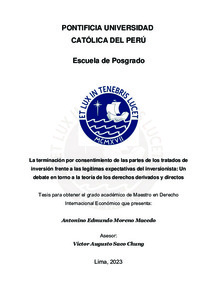La terminación por consentimiento de las partes de los tratados de inversión frente a las legítimas expectativas del inversionista: Un debate en torno a la teoría de los derechos derivados y directos
Abstract
En esta investigación, el autor realiza un análisis en torno a si la terminación por
consentimiento de las partes de un acuerdo internacional de inversiones (AII), ya
sea un tratado bilateral de inversiones (TBI) o un tratado de libre comercio con
capítulo de inversión (TLC), resultaría contrario a las legítimas expectativas del
inversionista.
A fin de brindar una respuesta, se considera indispensable estudiar la figura
jurídica de la terminación de los tratados, con especial énfasis en los AII, en vista
de que estos poseen disposiciones conocidas como cláusulas de supervivencia
en mérito de las cuales las protecciones que brinda un AII permanecen por cierto
periodo luego de terminado el tratado.
Luego de ello, se abordará la discusión en torno a la naturaleza de los derechos
del inversionista, es decir, las teorías de los derechos directos y derivados, a fin
de establecer si, bajo alguna de estas, es posible alegar que la terminación por
consentimiento del AII en cuestión supone una vulneración de los derechos del
inversionista.
Finalmente, se estudiarán a las legítimas expectativas del inversionista dentro
del estándar del trato justo y equitativo, además de analizar si, concretamente,
estas suponen una obligación de estabilidad jurídica, para luego examinar las
distintas estrategias que podrían ser invocadas por el inversionista,
identificándose entre ellas el considerar a las legítimas expectativas como parte
del trato justo y equitativo, como principio general del derecho internacional y
como un acto unilateral del Estado.
Palabras Clave: terminación por consentimiento, cláusulas de supervivencia,
derechos del inversionista, legítimas expectativas, trato justo y equitativo,
principios generales del derecho internacional, actos unilaterales de los Estados,
Derecho Económico Internacional, Derecho de las Inversiones Internacionales. In this research, the author performs an analysis on whether the termination by
consent of the parties of an International Investment Agreement (IIA), would be
considered as a breach of the obligation to protect the legitimate expectations of
the investor.
In order to provide an answer, a survey of the rules that regulates the termination
of the treaties is considered essential, with special emphasis on IIAs, given that
these have provisions known as survival clauses which allow that the protections
provided by an IIA remain for a certain period after the termination of the relevant
treaty.
After that, the discussion will be focused on the nature of the investor's rights, i.e,
the theories of direct and derivative rights. The reason for this is for establishing
whether, under any of these theories, it is possible for the investor to file a claim
against the host State for breach of its legitimate expectations due to the mutual
termination of the AII.
Finally, the obligation to protect the legitimate expectations of the investor are
studied, the assessment that is employed is to determine when does this exist
and the scope of their protection, specifically if they imply an obligation of legal
stability.
After that, the author will review the different strategies that could be invoked by
the investor, identifying among them, considering legitimate expectations as part
of fair and equitable treatment, as customary international law, as a general
principle of international law and as a unilateral act of the State.
Keywords: termination by consent, survival clauses, investor rights, legitimate
expectations, fair and equitable treatment, general principles of international law,
unilateral acts of State, Economic International Law, International Investment
Temas
Inversiones extranjeras--Legislación
Inversiones--Tratado internacionales
Derecho internacional económico
Inversiones--Tratado internacionales
Derecho internacional económico
Para optar el título de
Maestro en Derecho Internacional Económico





